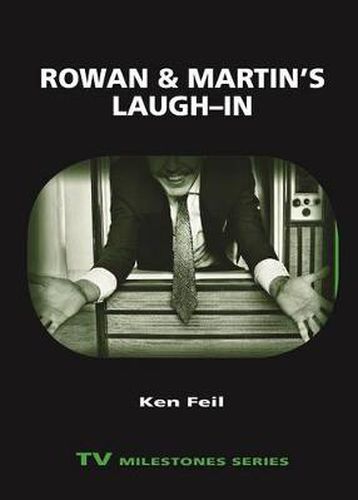Readings Newsletter
Become a Readings Member to make your shopping experience even easier.
Sign in or sign up for free!
You’re not far away from qualifying for FREE standard shipping within Australia
You’ve qualified for FREE standard shipping within Australia
The cart is loading…






The highest-rated network program during its first three seasons, comedy-variety show Rowan and Martin’s Laugh-In (NBC, 1968-1973) remains an often overlooked and underrated innovator of American television history. Audiences of all kinds - old and young, square and hip, black and white, straight and queer - watched Laugh-In, whose campy, anti-establishment aesthetic mocked other tepid and serious popular shows. In Rowan and Martin’s Laugh-In, author Ken Feil presents the first scholarly investigation of the series whose suggestive catch-phrases
sock it to me,
look that up in your Funk'n'Wagnalls,
and
here comes the judge
became part of pop culture history.
In four chapters, Feil explores Laugh-In’s newness, sophisticated style, irreverence, and broad appeal. First, he considers the show’s indulgence of
bad taste
through a strategy of deliberate ambiguity that allowed audiences to enjoy countercultural, anti-establishment transgression and, reassuringly, conveyed the sense that it represented the establishment’s investment in containing such defiant delights. Feil considers Laugh-In’s camp, otherness, and
open secrets
as well as the show’s conflicted positions on the
private
issues of taste, sexuality, lifestyle, and politics. Sexual swingers, stoned hippies, empowered African Americans, feminists, and flamboyantly
nellie
men all filled Laugh-In’s routine roster, embodied by cast members Jo Anne Worley, Lily Tomlin, Chelsea Brown, Alan Sues, Johnny Brown, and Judy Carne, along with regular guests Flip Wilson, Sammy Davis Jr., and Tiny Tim. Related to these icons, Laugh-In reflected on hotly politicized current events: militarism in Vietnam, racist discrimination in the U.S., Civil Rights and Black Power, birth control and sex, feminism, and gay liberation.
In its playful put-ons of the establishment, parade of countercultural types and tastes, and vacillation between identification and repulsion, Feil argues that Laugh-In’s intentional ambiguity was part and parcel of its inventiveness and commercial prosperity. Fans of the show as well as readers interested in American television and pop culture history will enjoy this insightful look at Rowan and Martin’s Laugh-In.
$9.00 standard shipping within Australia
FREE standard shipping within Australia for orders over $100.00
Express & International shipping calculated at checkout
The highest-rated network program during its first three seasons, comedy-variety show Rowan and Martin’s Laugh-In (NBC, 1968-1973) remains an often overlooked and underrated innovator of American television history. Audiences of all kinds - old and young, square and hip, black and white, straight and queer - watched Laugh-In, whose campy, anti-establishment aesthetic mocked other tepid and serious popular shows. In Rowan and Martin’s Laugh-In, author Ken Feil presents the first scholarly investigation of the series whose suggestive catch-phrases
sock it to me,
look that up in your Funk'n'Wagnalls,
and
here comes the judge
became part of pop culture history.
In four chapters, Feil explores Laugh-In’s newness, sophisticated style, irreverence, and broad appeal. First, he considers the show’s indulgence of
bad taste
through a strategy of deliberate ambiguity that allowed audiences to enjoy countercultural, anti-establishment transgression and, reassuringly, conveyed the sense that it represented the establishment’s investment in containing such defiant delights. Feil considers Laugh-In’s camp, otherness, and
open secrets
as well as the show’s conflicted positions on the
private
issues of taste, sexuality, lifestyle, and politics. Sexual swingers, stoned hippies, empowered African Americans, feminists, and flamboyantly
nellie
men all filled Laugh-In’s routine roster, embodied by cast members Jo Anne Worley, Lily Tomlin, Chelsea Brown, Alan Sues, Johnny Brown, and Judy Carne, along with regular guests Flip Wilson, Sammy Davis Jr., and Tiny Tim. Related to these icons, Laugh-In reflected on hotly politicized current events: militarism in Vietnam, racist discrimination in the U.S., Civil Rights and Black Power, birth control and sex, feminism, and gay liberation.
In its playful put-ons of the establishment, parade of countercultural types and tastes, and vacillation between identification and repulsion, Feil argues that Laugh-In’s intentional ambiguity was part and parcel of its inventiveness and commercial prosperity. Fans of the show as well as readers interested in American television and pop culture history will enjoy this insightful look at Rowan and Martin’s Laugh-In.